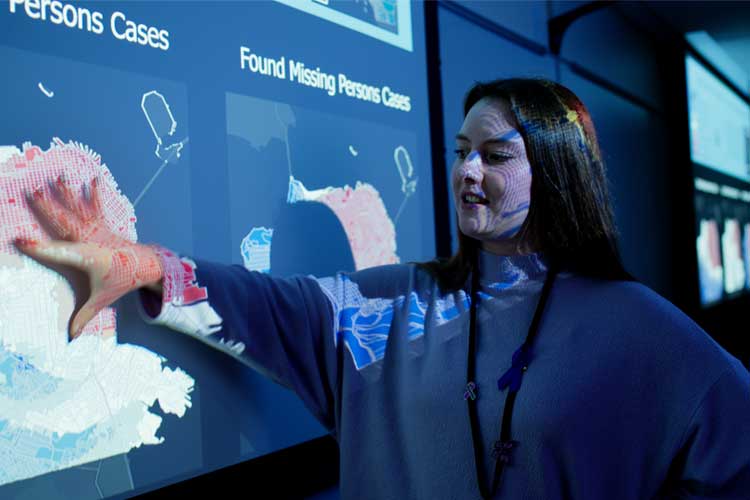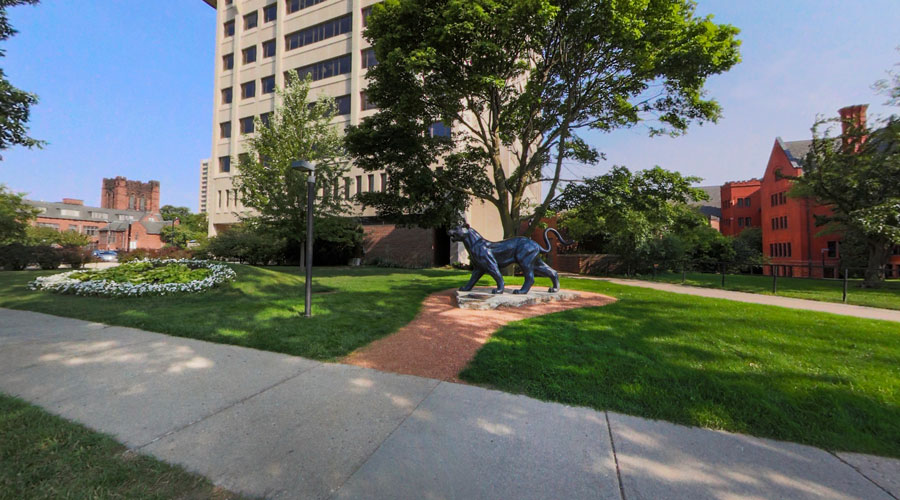Criminal Justice and Criminology BS
Our criminal justice degree graduates have impressive careers. Thousands have gone on to work in government agencies, the private sector and nonprofit agencies. They work as FBI agents, investigators, crime analysts, probation officers/agents, chiefs of police departments and more.
UWM also offers an online Bachelor of Science in Criminal Justice & Criminology.
Program Type
Major
Program Format
On Campus
Criminal Justice & Criminology Highlights
The BS in Criminal Justice and Criminology program at UW-Milwaukee connects students to agencies, police departments, businesses and government entities.
Students can specialize in crime analysis, which is one of the fastest growing areas of criminal justice, or complete their bachelor’s and master’s degrees in criminal justice and criminology in as little as five years with the criminal justice and criminology accelerated graduate degree.
The criminal justice field program offers students the opportunity to earn course credit and make career connections while working in a criminal justice setting.
Located in the largest city in Wisconsin, the school provides an unmatched environment for students to earn their criminal justice degree. UWM criminal justice majors study three broad areas of this diverse profession: law enforcement, the courts and corrections. Students study the nature and causes of crime, the impact of crime on individuals and society, and the criminal justice system.
The curriculum prepares students as generalists in criminal justice and is well suited for those who want to pursue graduate work in criminal justice, law, public administration, and the social sciences.
Videos about Criminal Justice & Criminology at UWM
Criminal justice and criminology majors beginning in Fall 2023 or later will complete 21 credits of general education requirements, 45 credits in the criminal justice and criminology major (27 credits of mandatory courses and 18 credits of elective courses), and 54 credits of general electives. A minimum of 120 credits are required for graduation.
Criminal justice and criminology elective courses address criminal profiling, criminal evidence and investigation, white-collar crime, juvenile justice, victimology, jails, women and the criminal justice system and more.
Criminal justice degree students may also use elective courses to specialize in crime analysis, participate in field education, study abroad, or pursue a forensic science certificate. General electives (54 credits) can be used to add an additional major, minor or certificate.
All students must meet UWM’s General Education Requirements. Students must complete English and math within their first 30 credits.
Criminal Justice & Criminology Field Education
Students earn three credits for each semester of field placement. Field placement is elective; however, it is strongly encouraged. A student must commit a minimum of eight hours per week to the agency for the entire semester. Some agencies require more than eight hours per week from a student. Students can apply for field placement in their junior year.
Transfer Students
Upon admission, the UWM Registrar’s Office will evaluate and apply a student’s previous coursework (please allow two to four weeks for this process). A student who transfers from a campus within the UW System or the Wisconsin Technical College System can transfer up to 72 credits toward a degree in the Helen Bader School of Social Welfare.
Students transferring from a school within the UW System or the Wisconsin Technical College System can learn how credits may transfer by using Transfer Wisconsin.
As soon as they are admitted, and the UWM Registrar’s Office has completed the transfer credit evaluation process, students should meet with an academic advisor to review transfer course equivalencies, discuss program requirements and create an academic plan for coming semesters.
- Criminal Justice 110: Introduction to Criminal Justice, 3 credits
- Criminal Justice 271: Introduction to Policing, 3 credits
- Criminal Justice 273: Introduction to Corrections, 3 credits
- InfoSt 370: Data Analysis and Visualization for the Information Professional, 3 credits
- Criminal Justice 275: Introduction to Criminal Courts, 3 credits
- Criminal Justice 305: Criminological Theory and Policy, 3 credits
- Criminal Justice 310: Race, Ethnicity, and Justice, 3 credits
- Criminal Justice 662: Methods of Social Welfare Research, 3 credits
- Criminal Justice 663: Criminal Justice Capstone Seminar, 3 credits
- Criminal Justice Electives: Electives in Criminal Justice, 18 credits
- TOTAL Credits: 45
Sample Course of Study for Criminal Justice Degree Covering Eight Full-Time Semesters
This is only one model of selecting courses for a four-year sequence to degree requirements. This chart is not intended to be a guide for the selection of specific courses or to substitute for academic advising. For suggestions about specific courses and other schedule options, students are strongly encouraged to meet with their academic advisors.
Year 1
Fall Semester
| Course | Credits |
|---|---|
| CRM JST 105: Orientation | 1 |
| CRM JST 110: Introduction to Criminal Justice | 3 |
| Math (if necessary) | 3 |
| English (if necessary) | 3 |
| GER Humanities | 3 |
| GER Social Science | 3 |
| TOTAL | 16 |
Spring Semester
| Course | Credits |
|---|---|
| CRM JST 271: Introduction to Policing | 3 |
| CRM JST Elective | 3 |
| GER Arts | 3 |
| GER Social Science | 3 |
| General Elective | 3 |
| TOTAL | 15 |
Year 2
Fall Semester
| Course | Credits |
|---|---|
| CRM JST 273: Introduction to Corrections | 3 |
| CRM JST 275: Introduction to Criminal Courts | 3 |
| COMMUN 103: Public Speaking | 3 |
| GER Natural Science | 3 |
| General Elective | 3 |
| TOTAL | 15 |
Spring Semester
| Course | Credits |
|---|---|
| CRM JST 305: Criminological Theory and Policy | 3 |
| CRM JST Elective | 3 |
| GER Natural Science Lab | 3 |
| General Elective | 3 |
| General Elective | 2 |
| TOTAL | 14 |
Year 3
Fall Semester
| Course | Credits |
|---|---|
| CRM JST 310: Race, Ethnicity, and Justice | 3 |
| CRM JST Elective | 3 |
| General Elective | 3 |
| General Elective | 3 |
| General Elective | 3 |
| TOTAL | 15 |
Spring Semester
| Course | Credits |
|---|---|
| InfoSt 370: Data Analysis and Visualization for the Information Professional | 3 |
| CRM JST Elective | 3 |
| General Elective | 3 |
| General Elective | 3 |
| General Elective | 3 |
| TOTAL | 15 |
Year 4
Fall Semester
| Course | Credits |
|---|---|
| CRM JST 662: Methods of Social Welfare Research | 3 |
| CRM JST Elective | 3 |
| General Elective | 3 |
| General Elective | 3 |
| General Elective | 3 |
| TOTAL | 15 |
Spring Semester
| Course | Credits |
|---|---|
| CRM JST 663: Capstone Seminar | 3 |
| CRM JST Elective | 3 |
| General Elective | 3 |
| General Elective | 3 |
| General Elective | 3 |
| TOTAL | 15 |
| Total Credits | 120 |




